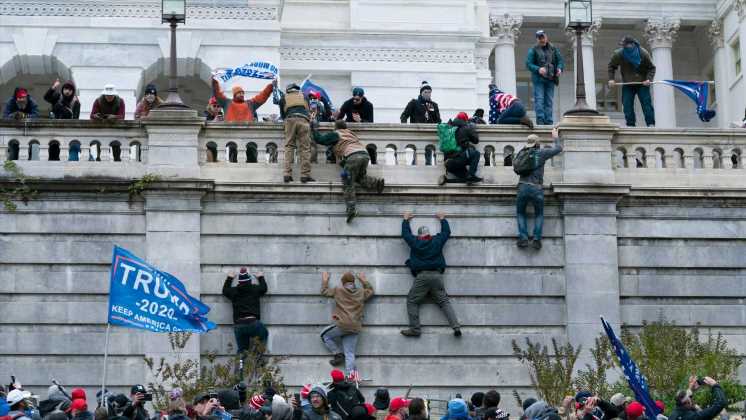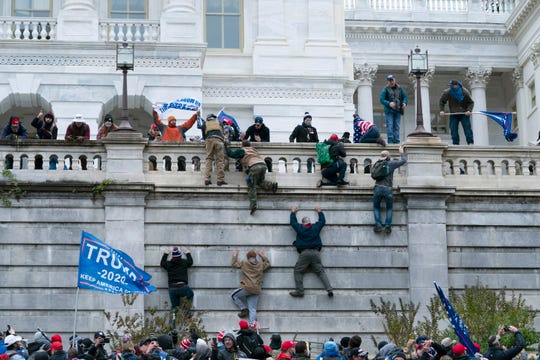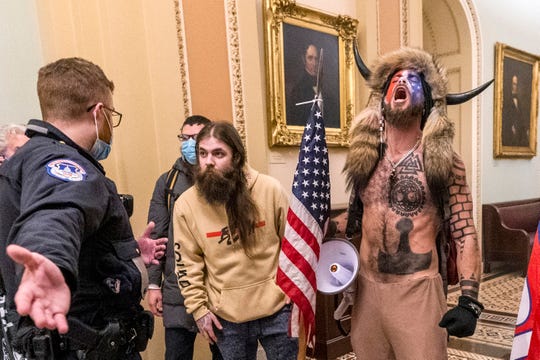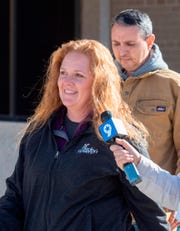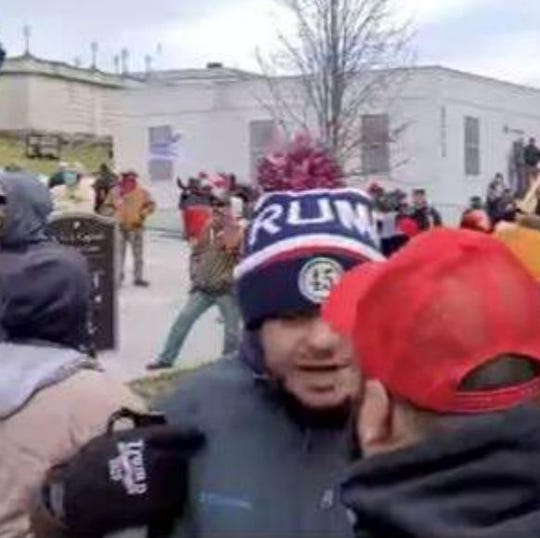WASHINGTON – Faced with strong evidence in the form of videos, pictures and social media posts, attorneys for Capitol riot defendants are using different and headline-grabbing tactics to defend their clients.
Some blamed Washington, D.C.’s media-saturated cancel culture as they seek to move trials elsewhere. Some claimed self-defense. Some tried to diminish their clients’ culpability for the events on Jan. 6, when a pro-Trump mob forced their way inside the Capitol, disrupted Congress as it counted state-certified Electoral College votes and vandalized offices in a riot that ultimately saw five people die and about 140 police officers injured.
Some blamed Donald Trump, arguing their clients believe they were acting on the former president’s instructions and with his endorsement.
Others were more colorful.
One attorney representing a self-proclaimed “QAnon Shaman,” mocked his client and many of the more than 400 people the Justice Department has charged, questioning their mental state and intellectual abilities in a recent expletive-laden interview.
Timeline: How the storming of the U.S. Capitol unfolded on Jan. 6
Another said his client was brainwashed after consuming way too much Fox News content.
Here’s how attorneys for some of the Capitol riot suspects are defending their clients:
Angry supporters of President Donald Trump scale the west wall of the the U.S. Capitol in Washington on Jan. 6, 2021. (Photo: JOSE LUIS MAGANA/ASSOCIATED PRESS)
Foxitis and mental disabilities
Capitol riot defendant Anthony Antonio had watched so much Fox News that he was inflicted with “Foxitis” and “Foxmania” and was brainwashed into believing the presidential election was stolen from Trump, his attorney, Joseph Hurley, told a judge earlier this month, according to Huffington Post.
Antonio was laid off from his job because of the pandemic and spent the next several months watching Fox News, Hurley said.
Antonio, Hurley said, “started believing what was being fed to him.”
Officials said Antonio, of Delaware, climbed on the scaffolding outside the Capitol, entered the building through a broken window, squirted water at an officer who was being dragged by rioters, and threatened other police officers.
In an interview with Talking Points Memo this week, another attorney insulted his client and others who have been charged, saying their fragile mental state made them vulnerable to Trump’s “propaganda” efforts.
“A lot of these defendants are al f—– short-bus people,” attorney Albert Watkins said, referring to an offensive slang term for school buses used to transport students with disabilities. “These are people with brain damage.”
Supporters of President Donald Trump, including Jacob Chansley, right with fur hat, are confronted by U.S. Capitol Police officers outside the Senate Chamber inside the Capitol in Washington on Jan. 6, 2021. (Photo: Manuel Balce Ceneta, AP)
Watkins, who represents Jacob Chansley, widely known as the QAnon Shaman, declined to apologize for the derogatory remarks, telling CNN that his vulgarity brought attention to his client’s “special needs.”
Chansley, who stormed the Capitol in a fur hat and horns, was seen on video standing atop scaffolding outside the building and was among the first to enter a breached door.
Blame Trump
Many have blamed the former president, saying his words were seen as a stamp of approval.
Attorneys for William Chrestman, who was seen on video brandishing an axe handle while wearing tactical gear inside the Capitol, argued he believed he and others “had an official endorsement” from the president to do what they did.
Months before the presidential election, Trump told the Proud Boys, an extremist group with ties to white supremacy, to “stand back and stand by.” Before Trump’s supporters marched to the Capitol on Jan. 6, Trump encouraged them to “stop the steal.”
Chrestman, a member of the Proud Boys’ Kansas City chapter described by some media outlets as the leader of the chapter, believed these were instructions from the former president to go to the Capitol and stop the certification of the Electoral College vote, his attorneys argued in court records.
The planned protests turned into riots after pro-Trump demonstrators stormed the U.S. Capitol.
USA TODAY
But that defense is unlikely to work.
U.S. District Judge Beryl Howell said the defendants were aware their conduct was illegal, citing the “obvious police barricades, police lines and police orders restricting entry to the Capitol.”
‘You left us’: Proud Boys leader Ethan Nordean slams Trump in expletive-laden message
To accept the Trump-told-me-to-do-it defense would mean also accepting that the former president had the power to sanction illegal activity and set aside “the entire corpus of criminal law” as it applied to his supporters, Howell wrote.
“No American president holds the power to sanction unlawful actions because this would make a farce of the rule of law … no President may unilaterally abrogate criminal laws duly enacted by Congress as they apply to a subgroup of his most vehement supporters,” Howell wrote.
Cancel culture
An attorney representing Jenny Cudd is seeking to move her trial elsewhere, arguing that media coverage portraying Cudd as a white supremacist has “irreversibly tarnished” any potential jury pool in predominantly Democratic Washington, D.C.
Marina Medvin, a conservative attorney in Alexandria, Va., also said the anti-Trump sentiment and the so-called “cancel culture” – which Medvin said denotes social pariah status – are too deeply ingrained in the district.
“The D.C. venire is polluted by the city’s political culture of ‘cancelling’ those associated with allegations of ‘white supremacy.’ A guilty verdict by a D.C. jury could be readily based on pretrial media affiliation of Ms. Cudd with “white supremacy,” Medvin argued in a court filing in March. “A not guilty verdict would be the political equivalent of social sin, of letting a ‘white supremacist’ off the hook or acting on her ‘white privilege,’ regardless of the facts of the case.”
Cudd, a florist from Midland, Texas, is charged after she recorded a video of herself inside the Capitol. In the video, Cudd said she “charged the Capitol today with patriots.”
Lawyers for Jenny Cudd, who is accused of participating in the U.S. Capitol riot, filed a motion asking the Department of Justice to let her go on her Mexican vacation as planned. (Photo: Tim Fischer/AP)
Prosecutors said Washington, D.C. has seen its fair share of politically charged cases. “High-profile individuals such as John Poindexter, Oliver North, Scooter Libby, and, more recently, Roger Stone, all received fair trials in this jurisdiction by unbiased juries,” prosecutors argued in a motion opposing Cudd’s request for a change of venue.
Prosecutors also rejected the notion that Cudd has been singled out by the Washington, D.C. media, saying much of the media coverage of her case came from Midland, Texas, where she seeks to be tried.
Self-defense, insufficient evidence
Others said their clients merely defended themselves and were not part of a conspiracy to storm the Capitol.
Joseph Tacopina, who represents one of the defendants charged with assaulting Capitol Police officer Brian Sicknick, said his client used pepper spray only after being doused with chemical irritants by police. Julian Khater acted out of “panic,” Tacopina argued at a bail hearing in April.
“Mr. Khater was not part of the Proud Boys or other extremist groups who prepared for months in advance,” Tacopina said. “He was a guy.”
Julian Elie Khater, 32, of State College, Pennsylvania, was charged in the assault of Capitol Police Officer Brian Sicknick. (Photo: FBI affidavit)
Khater and his co-defendant, George Tanios, were accused of dousing police officers, including Sicknick, with chemical spray. Prosecutors said during the bail hearing that the two were “lying in wait” before the attack, which temporarily blinded and staggered Sicknick, along with two other officers.
Elizabeth Gross, who represents Tanios, said there’s no evidence that Tanios intended to target the officers.
“There is no doubt that there is a serious offense alleged,” Gross told a judge during a bond hearing in March. “But you are hearing their storyline. Is it serious? Yes. But what do we know? Not much.”
Other attorneys, like Lisa Costner, have argued their clients aren’t as culpable because they never entered the Capitol. Costner represents Charles Donohoe, a Proud Boys leader who’s among several defendants charged with conspiracy.
Costner also said that any celebratory comments Donohoe made about the riot resulted from braggadocio while drinking with friends afterward.
“This is not a man who was marshaling a large group of Proud Boys,” Costner said. “I think that’s a pretty far stretch.”
In another case, an attorney for Thomas Caldwell, an accused Capitol riot organizer who’s associated with the paramilitary Oath Keepers group, said prosecutors have produced “no evidence” of an actual plan to invade the Capitol.
David Fischer also sought to distance his client from the Oath Keepers group, saying Caldwell was not an actual member.
U.S. District Judge Amit Mehta has released Caldwell to home confinement, saying he is “differently situated” from his co-conspirators because he ultimately did not enter the Capitol.
Contributing: Kevin Johnson and Bart Jansen of USA TODAY, The Arizona Republic, The Delaware News Journal
Source: Read Full Article
